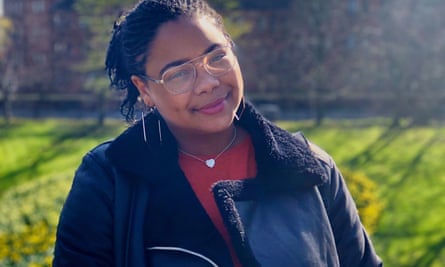NUS president Larissa Kennedy: ‘I worry universities won’t put student and staff
It’s over two weeks since a disastrous A-level results day, and yet the fallout continues. Nearly 40% of predicted grades were downgraded by a flawed algorithm that was introduced when students’ exams were cancelled during the Covid-19 lockdown. Four days later, after much public outcry, the education secretary Gavin Williamson announced that results would instead be based on teachers’ own assessments. Lots of students who made their grades after the U-turn lost their 2020 university places.
“It’s just been an utter shambles,” says Larissa Kennedy, the new president of the National Union of Students (NUS). “The government dug their heels in despite the fact that months ago we, alongside many others in the sector, said this would happen. Gavin Williamson should have owned up to the grave error much earlier on, and admitted that this was completely unjust.”
Some students were worse affected by the blunder than others. Those from disadvantaged backgrounds were more likely to be downgraded, while private school students were awarded more than twice as many A and A* grades as comprehensive schools. Kennedy says she is worried about the long term effects this unfair system will have on the next generation. “It’s impacted who’s chosen which places, who’s had to pick a different university, who’s been forced to defer. And it will have an impact on the demographics of our universities. The fact this was based on last year’s results has exposed how education reproduces inequality.”

Then there are those students who are still in limbo despite the U-turn. Many B-Tec students still haven’t received their results, while external candidates – such as home tutored students – have been left without grades. “We need to sort out the appeals process, the resits process, and make them free to use,” she says.
Kennedy may only be 22, but she has six years of grassroots activism under her belt. She started as a 16-year-old Girl Guide, campaigning on sexual harassment in schools. She paused her studies in politics, international studies and Hispanic studies to become a student union officer at Warwick University. She was also president of its antiracism society. During this time she became interested in “how misogyny, racism, classism and other forms of oppression become reproduced by the education system” – which is more evident than ever during the Covid-19 crisis, she says.
In the few weeks since becoming leader of the NUS, which represents seven million students, her work has been dominated by issues around coronavirus. Next month, students will return to campuses, where universities will decide their own safety measures. Some will run Covid testing schemes, for example, while most have promised teaching in person as well as online. “A real worry is that we cannot trust universities to put student and staff safety first, because they are too preoccupied with their position in the market,” says Kennedy, referring to a recent report by the Independent Sage committee, which recommended that universities should teach online as the default, to avoid spreading the virus.
“They’re committing to in-person teaching, which they haven’t necessarily thought through from a safety perspective because they’re in competition with other institutions. Immunocompromised students and disabled students are once again being erased from the conversation, and of course their staff counterparts.”
As the NUS approaches its 100th year, Kennedy is excited for her term. But she inherits an organisation that has faced problems with low member turnout and a near financial collapse in recent years. She wants to work towards “a new NUS”, she says.
What does she mean by that? “For a long time, we’ve run quite a lot of campaigns, and I’ve come in and said I want things to be really focused, but huge.”
You could say Kennedy doesn’t have much choice but to focus on fewer campaigns, given last year’s cuts to NUS staff – but she is ambitious.
She has two main campaigns: “First and foremost, we need to start thinking about what a fully funded, accessible, democratised education system looks like and the role of students at the heart of that,” she says.
Her other priority, she says, is the decolonisation of universities – addressing biases that discriminate against black and minority ethnic students and staff. It’s an issue that has made headlines this year, with the revival of the Rhodes Must Fall campaign at Oxford University, for example. After five years of student campaigning, Oriel College finally agreed to remove its statue of the Victorian imperialist Cecil Rhodes.
Kennedy acknowledges this progress, but she worries about the movement being diluted. “While it has gained traction, we’ve seen people using the language of decolonisation when they’re actually talking about some random diversity scheme they’re running….
Read More: NUS president Larissa Kennedy: ‘I worry universities won’t put student and staff

